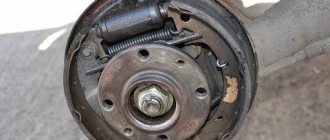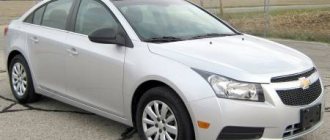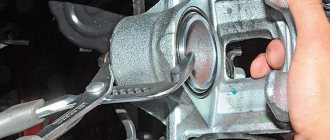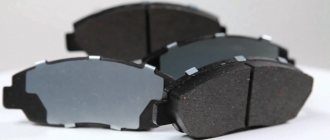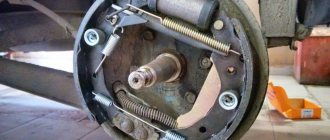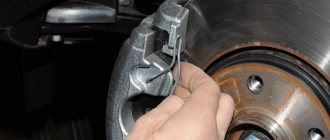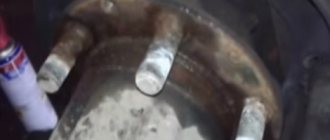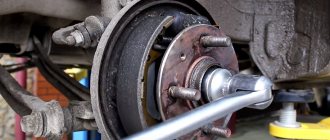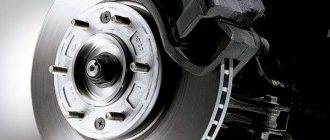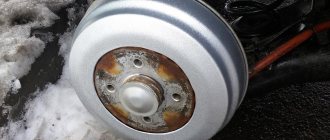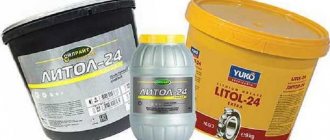All vehicle systems must be in good working order during its operation. But special attention needs to be paid to the brakes. After all, the lives of the driver, passengers, other road users and pedestrians often depend on the condition of the car’s braking system. It needs to be serviced periodically. This consists of replacing brake pads, discs, fluid, and calipers. For example, lubricant for brake cylinders is absolutely necessary when servicing and replacing them. We'll talk about all this.
Lubricating the caliper guides
Before moving directly to the cylinder, you need to understand its guides. The brake system generates a large amount of heat during operation. This leads to the fact that the connections often stick tightly. This also applies to guides that begin to jam. There is nothing good in this as it can lead to serious consequences. Wedging ensures that the pads are constantly pressed against the disc. This leads to significant overheating of the system. As a result, the pads burn and the discs become crooked. And a tire can easily catch fire in such conditions. That is why when servicing the caliper it is necessary to treat the guides with special lubricant. We will figure out which one exactly in this article.
Which caliper lubricant is better, and which formulations will not give the desired effect?
The most correct option is to choose a quality product. It is important to remember that low-temperature lubricants dry out quickly and are then washed out, which leads to jamming and squeaking. For the “fingers” it is important to use a very flexible, preferably synthetic, lubricant that will not leak. The back side of the brake pads should be coated with special anti-squeak lubricants.
Experts advise you to abandon formulations that do not meet the technical parameters described above, otherwise the result will be a faulty mechanism and additional costs for replacing parts.
Lubricant properties for cylinders and guides
Since the unit is heavily loaded and during operation heats up to 300 degrees Celsius, and even higher during aggressive driving, the approach must be appropriate. Lubricant for brake cylinders must have the following characteristics:
- operating temperature - from 150 degrees Celsius and above;
- resistance to aggressive environments (salt, reagents);
- minimal change in viscosity with increasing temperature.
It is based on the above parameters that lubricant for brake cylinders and guides should be selected. Fortunately, nowadays the assortment is simply huge, so it shouldn’t be difficult to choose.
Copper grease for brake cylinders and calipers
It is the most common and popular among motorists. It is not afraid of high temperatures and is inexpensive, this is what makes it so popular. Most often used for processing discs, brake pads, as well as calipers and other elements of the brake system. It is worth noting that copper grease is applied to the reverse side of the product. If these are pads, then their front side should not be covered with any lubricant; this also applies to discs.
The process of applying the paste is also extremely simple. To do this, the surface to be treated is cleaned of dirt and corrosion. Next, lubricant is applied using a brush and distributed evenly over the entire surface. It is worth noting that it is also sold in cans, in which case it needs to be sprayed after reading the instructions for use.
The best caliper lubricant in paste form
Lubricant for brake calipers and guides in the form of a paste is most in demand among car enthusiasts. As a rule, it is an order of magnitude cheaper than liquid analogues, and when using it, you can conveniently control the entire process, accurately distributing the product over the entire surface of the brake system. Paste can be made from a wide variety of ingredients. So, most budget options have mineral oil as the main substance. Expensive samples are made from silicone or synthetics, and molybdenum, one of the highest quality lubricants, often acts as a protective element. Read more about the individual advantages and disadvantages of various brands in our top.
5 – Lavr BRAKE CONTROL
Lavr BRAKE CONTROL paste is universal in its application. It is suitable both for calipers and guide pins, and for lubrication of the piston cylinder. Thanks to the anti-friction characteristics and proprietary chemical composition, absolutely the entire surface of the vehicle's braking system resists wear, reducing the risk of scuffing and corrosion. Despite all the obvious advantages, this product is not in high demand; experts are also neutral about it. Also, car owners sometimes complain about non-compliance with the declared quality, which indicates some problems in production.
| Advantages and disadvantages of Lavr BRAKE CONTROL | |
| Universal set of elements | Relatively high probability of manufacturing defects |
| Convenient packaging | |
4 – ABRO Synthetic Brake & Caliper Grease
ABRO is a fairly well-known manufacturer that often pleases car enthusiasts with reliable and budget-friendly products. In particular, this paste combines excellent characteristics and high-quality composition, while its market price is significantly lower than that of similar lubricants for calipers and guides. It has a synthetic base and contains a universal set of components that provide maximum brake wear protection. Thus, among them are molybdenum and Teflon, which are usually used in the production of products with an above-average price. The only thing is that all the advantages of the product are known only from the manufacturer’s words; it was not possible to find reliable sources about the tests, hence this position in our top.
| Advantages and disadvantages of ABRO Synthetic Brake & Caliper Grease | |
| Original composition | Insufficient expert information and test results |
| Attractive price | |
| Contains Teflon and molybdenum | |
3 – TRW PFG110
The big disadvantage of many budget lubricants is low adhesion to the surface of the lubricated module. Immediately before the application itself, you always need to carry out procedures for cleaning and degreasing the brake system of the car, and this creates certain difficulties during work. However, TRW PFG110 paste eliminates this tedious need. It can be used even on contaminated parts (of course, within reason) without loss of quality. After processing, the lubricated modules are covered with a dense film with a water-repellent component, which prevents corrosion. In addition, this product goes well with brake fluid and chemicals. However, the manufacturer is American, so the price is quite high.
| Advantages and disadvantages of TRW PFG110 | |
| Easily applied to any brake surface | High price |
| Chemical resistance | |
| Lithium based thickener | |
2 – VMPAUTO MS 1600
In terms of lubricant production technology, VMPauto has advanced significantly further than its competitors. It has its own laboratory, which allows it to test manufactured products, improve them and introduce universal and reliable products to the market. Specifically in this case, the lubricant has anti-corrosion properties and is also endowed with the protective ability to withstand temperatures up to 1000 degrees. Of course, the indicator is not the highest, but in terms of price/quality ratio it is the best option. It can lubricate both the caliper and guides, as well as the piston cylinder. According to tests, the use of this brand reduces the load on the moving fingers and on the entire brake system as a whole, making wear on the pads and side modules of the car less noticeable.
| Advantages and disadvantages of VMPAUTO MS 1600 | |
| High ductility | Lack of anti-squeak properties |
| Withstands heat up to 1000 degrees | |
| Relatively cheap | |
| Significantly shortens braking distance | |
1 – RUSEFF
Based on reviews from car owners and the number of mentions in thematic publications and ratings, the domestic brand RUSEFF can rightfully be called one of the most popular. In addition, experts say that this product is the best in this category, at least for its price. It has a synthetic base that includes anti-friction and anti-squeak elements. Once the paste is applied to all the necessary modules, the annoying grinding noise will disappear, and most importantly, the service life of the entire vehicle system will increase. However, with many positive aspects among car enthusiasts, there is an opinion that something else should be used to lubricate the piston cylinder and guide pins.
| Advantages and disadvantages of RUSEFF | |
| Good freezing limit | Low drop threshold |
| High-quality anti-squeak properties | |
| Optimal price | |
| Experts' Choice | |
Basic base for high temperature grease
There is currently a huge selection on the shelves of auto stores. But if you look at it, there are only 3 broad groups:
- mineral based;
- synthetic base;
- mineral or synthetic base containing small amounts of metals.
If you figure out what kind of lubricant should be used under the brake cylinder boot, then the one that is made on a synthetic basis is best suited. This is due to the fact that it is neutral to rubber and plastic products. Consequently, the boots are not corroded and are ideal for machining brake piston or caliper guides. The base used provides a number of advantages, such as low volatility, high temperature threshold, and insolubility in water and other liquids. Overall, an excellent choice, although not always budget-friendly.
Mineral-based lubricant for brake cylinder pistons is much cheaper. But it is still better suited for guides, as it can withstand temperatures from -45 to +180 degrees Celsius.
What should I lubricate with?
What kind of lubricant should I use to lubricate the brake caliper guides to protect them with maximum reliability? Even if you do not know the names of modern lubricants, you can navigate their technical characteristics. By understanding the requirements for guide lubricants, you will be able to say for sure what is right for you. Much also depends on the materials from which the caliper parts are made, since not every lubricant is compatible with them.
The main requirements for lubrication are as follows:
- the lubricant must have a high operating temperature (more than 180 degrees Celsius);
- at least, the operating temperature should not cause the lubricant to drip, that is, it is unacceptable for the lubricant to melt and leak out during operation of the guides;
- the lubricant must be waterproof and chemically stable, that is, water or brake fluid must not be its solvent;
- The lubricant is required to be compatible with every plastic or elastomeric part included in the caliper system, including the rubber that is often used there.
An equally important characteristic of the lubricant is the manufacturing company. High-quality brake caliper guide lubricants are rarely made by companies that make lubricants for everything else. The exception is brake system manufacturers, since many of them specialize in everything related to these systems. A good example of this is Toyota, Slipkote, etc., which are some of the most well-established brands today.
Lubricant with added ceramic particles
A relatively new development that has already gained popularity. It's not cheap, but the claimed benefits are very reassuring. Increased performance characteristics of the lubricant are achieved due to the presence of fine fractions in the ceramic composition. At the moment, this is one of the best methods of protecting brake cylinders and their seats from corrosion. In addition, the treated components eliminate the possibility of sudden temperature changes and the formation of dirt and dust on the surface.
Despite the high cost of such products, they are extremely popular among motorists. Can be used as a lubricant for rear brake cylinders, which are less loaded than the front ones. Among the most popular manufacturers it boasts high quality. Well, now let’s move on and consider a few more extremely important points.
How is the brake system serviced?
Complex lubrication is often recommended when replacing brake pads or discs. There is nothing complicated here. First of all, we inspect the condition of the guides. We clean the fingers and seats from rust and treat them with a certain amount of lubricant. Copper, graphite, etc. are suitable. As for the piston, lubricant is needed to reduce friction and protect against corrosion. It is advisable to treat the surface of the part with a small amount of ceramic lubricant. It will effectively protect the surface from rust.
An extremely important detail is that it is worth checking the condition of the boot regularly. If it is torn, no amount of lubricant will help. First you need to replace the rubber seal and then add lubricant. In addition, there should not be too much of it, as it will begin to squeeze out through the anthers and cuffs, which is not good.
Why and when to lubricate the brake caliper
“Every brake caliper mechanism” sounds a bit strange to many. In reality, the caliper is a complex assembly from a technical point of view, in which every detail requires special attention. If we mean the classic floating caliper disc brake caliper, this is what we get.
Brake pads, caliper is noisy
The creaking and squealing of brake pads is probably familiar to everyone. 90% of the noise from brake pads does not come from the plane of direct contact with the brake disc. And the noise depends on the anti-creaking mechanism (!), the back side of the pad, and the general condition of the caliper.
And, of course, on the quality and composition of the friction lining. We talked about this in more detail . In addition, critical wear of the brake pads does not mean that the linings are worn down to zero. In most cases, a 3-4 mm thickness of the linings (and even more so uneven) screams that the caliper requires maintenance.
Anti-squeak plates
An excellent invention by Bosch engineers, but it requires maintenance. By using the wrong lubricants on the anti-squeak mechanism, we only make the problem worse. Every time we replace the brake pads, we spend a few minutes of our precious attention, and the pads no longer squeak. But it is important to know what to lubricate them with.
Caliper guides
This formulation applies exclusively to classic-type brake calipers, used in the vast majority of budget (and not so budget) cars. The simplest spare part that controls the behavior of the entire brake mechanism. She doesn't care about all the electronics. If the caliper guide is in poor condition, expect problems.
It is important to keep in mind that caliper guides are not such an expensive part to restore (there are examples where they are simply riveted with a hammer). It is safer to pay exorbitant prices, but be sure that the brakes will be in order.
Guide boot
The condition of the caliper guides directly depends on the viability of the rubber boot. It is this that protects the guides from water, sand, and dirt. Any crack on the boot is a blow to the health of the caliper guides.
Interesting on the topic: Our Lanos: how to increase ground clearance
A little advice. If we are buying a repair kit for a caliper, it is extremely important to take a closer look at the quality of the boots. Even famous brands sometimes slip outright crap into repair kits. Good anthers will be elastic and look neat, as in the photo below.
Piston of the working brake cylinder
From time to time you watch popular videos on video hosting sites and your hair stands on end. The masters, as if with experience, put almost lithol or silicone grease into the pistons of the brake cylinders.
The problem is this. Corrosion eats away at the piston of the working cylinder due to the fact that the driver did not replace the brake fluid in time. But he doesn't know about it. He thinks that the piston is made of stainless steel and will withstand anything in the world.
No. The brake cylinder pistons are made of hardened steel and chrome plated.
When the chrome wears off, lousy brake fluid (any brake fluid absorbs moisture at an alarming rate) gets to the piston body. And this is where special lubricants are needed. At a minimum, to protect the brakes from seizing the pistons.
Let's draw our first conclusions
- Lubrication in the caliper is important not so much for optimizing the operation of the mechanism, but for prevention.
- The brake caliper must be lubricated every time the brake pads are replaced. Most officials and private masters know about this. But they don't.
- Each part of the brake caliper needs its own lubricant. There are no universal ones, with rare exceptions.
- By ignoring brake caliper lubrication, we endanger both ourselves and our passengers.
Any little thing that concerns the brake mechanism is not a small thing.
Advice from professionals
Many experts recommend not saving on lubricants for calipers and buying only proven products. For example, the optimal lubricant for brake cylinder pistons is silicone based. It is completely safe for anthers and at the same time is high-temperature. Therefore, it works effectively both in winter and summer.
Car service specialists often do not fulfill their direct duties. For example, when replacing pads, the calipers and guides should be cleaned, but no one does this. Therefore, it is better to do this yourself, especially since there is nothing complicated about it and even a beginner can handle it. You should not neglect the maintenance of the brake system, but it also makes no sense to look there every 500 kilometers. Inspect everything when replacing brake pads.
How often should calipers and pistons be lubricated?
People do not always know how often it is necessary to lubricate the described functional unit with a special paste. Personally, I do this every time they check the operation of the brake system, or rather, when replacing the pads. Sometimes the need for lubrication may be associated with the occurrence of squeaks and other foreign sounds.
As for the lubrication procedure, there is nothing complicated about it; just coat the parts. It is not necessary to apply the product in several layers. It is enough to use 2-3 grams of the substance.
Which lubricant is better to use?
It is advisable to use different types of lubricant depending on the part being processed. For example, graphite lubricant is ideal for caliper guides. It is inexpensive and can withstand high temperatures. Protects metal products from corrosion and prevents sticking. One of the most affordable options is TRW products.
The optimal lubricant for brake cylinder pistons should be silicone or ceramic based. The best manufacturer in this regard is Febi. Cheap and cheerful. But anti-squeak Liqui Moly is not recommended for placing under the piston boot, as it can cause destruction of the rubber seal.
Anti-squeak paste is excellent for treating the brake pad plate and retaining bracket. Usually this is where its use ends. Remember that the brake cylinder seals should not be lubricated with pastes that corrode the rubber seals. This can lead to complete destruction of the piston and caliper.
Requirements for ceramic lubricants
First of all, we need to address the question of why, in fact, such lubricants are called ceramic? As the name implies, they contain, among other components, microscopic elements of ceramics, which are distinguished by their high-temperature and wear-resistant properties. Many people know that various heat-resistant dishes, crucibles (quartz, porcelain, various oxides) and so on are made from ceramic materials. When producing lubricants, the same logic is followed. In addition, ceramic particles do not rust and are strong enough to withstand significant mechanical loads.
However, when choosing a particular lubricant, a number of additional requirements must be taken into account. In particular:
- wide temperature range, in particular a high upper limit;
- when operating at high temperatures, the lubricant should not exhibit the so-called dripping effect, during which it loses its performance properties;
- be waterproof, do not wash off and do not absorb moisture;
- be chemically stable, not change its composition and properties under the influence of various acids, alkalis and various chemical compounds;
- the lubricant must be neutral towards rubber and plastic.
Also, when choosing a particular lubricant, you need to pay attention to its physical state in the packaging. So, on sale there are aerosol cans and a tube with a dispenser and a brush. Cylinders are better suited for spraying lubricant over a large area, and a tube is better for spot application of lubricant.
Let's sum it up
As you can see, there is nothing difficult in servicing a car's brake system. But at the same time, it is extremely important to regularly lubricate all elements of the caliper, which operate at high temperatures every time. Pay attention to the guide pin anthers. They are also subject to wear, resulting in a rather unpleasant knocking noise on bumps. This happens due to the fact that the finger dangles freely in the seat and is not held by the plastic sleeve.
As for lubricants, there are simply a huge number of them nowadays. Any paste for lubricating brake cylinders, if it is intended for this purpose, will be suitable for use. It is not recommended to lubricate brake system parts with simple motor oil or grease, etc. All this will not lead to anything good.
Many parts of the brake system, with proper maintenance, can last 200-300 thousand kilometers or more, this applies to calipers, guides, pistons, etc. Pads and discs are more of a consumable item, but it is also advisable to look after them. All this will allow you to feel more confident behind the wheel and know for sure that the brakes will not let you down, because everything is lubricated and checked. Often the problem is with jamming of the guides and tight movement of the brake cylinder, which occurs in 90% of cases due to insufficient lubrication. If you use lubricant for the brake cylinder boots every time you replace the pads, then you will not have any problems with the car’s braking system.
The best caliper lubricant in spray form
This product is applied by spraying. It forms a dense film on the treated surface of the brake system, which minimizes friction and eliminates unwanted squeaks. Most often, such options are made of copper. These products are the most attractive in terms of price-quality ratio. More expensive products contain molybdenum mixtures, which significantly increase the protective characteristics of the brakes. The obvious disadvantage of this form is that applying the spray evenly to the surface of the caliper and guides is not an easy task, especially in cases where the contents are transparent.
5 – AutoProfi
In most cases, manufacturers impose some restrictions on the use of their products. For example, those products that are used as lubricants for a passenger car are not suitable for trucks. But for AutoProfi there are no such prohibitions. The modern spray from this brand is equipped with a proprietary set of persistent additives that can withstand heavy loads, thereby increasing the protective qualities of the processed modules. The temperature range is impressive, however, there is not a single source where one could find out about the composition of the product. The manufacturer itself does not publish this data. Therefore, taking into account the advantages and disadvantages, only fifth place in the ranking.
| Advantages and disadvantages of AutoProfi | |
| Suitable for processing any complex mechanisms | Lack of detailed information about lubrication |
| Copper base | |
4 – ABRO SL-200
It's no secret that city roads are sprinkled with a variety of chemicals that negatively affect the technical condition of the car. Of course, the brakes are the most vulnerable part, so they need protection first. It is precisely for such cases that this spray is needed, which has high resistance to chemicals as its main characteristic. The lubricant is universal and can be applied to all moving components, in particular to the caliper and guides. A dense film coating appears on the surface of the lubricated module, significantly extending the service life of the brake system.
| Advantages and disadvantages of ABRO SL-200 | |
| Excellent protection against chemicals | The described product characteristics are slightly exaggerated |
| Can be used not only for brakes | |
| Reliable composition | |
3 – Venwell Aluminum Spray
It is known that car brakes can heat up to 600 degrees, and with a sharp and sudden operation, even an order of magnitude more. A good lubricant for calipers and guides must withstand such loads, and the wider the spread of its operating temperature, the better. According to this criterion, Venwell Aluminum Spray has practically no equal - it operates without problems in the range from -60 to +1500 °C. Moreover, such a high result was confirmed by independent experts in laboratory conditions. We understand that you are unlikely to ever be able to reach the critical point, but an additional margin of safety will definitely not be superfluous. In addition, the spray is equipped with anti-corrosion properties, does not react with reagents and repels moisture.
| Advantages and Disadvantages of Venwell Aluminum Spray | |
| Highest temperature limits | Hard to find in stores |
| Moisture resistance | |
| Does not react with chemicals | |
2 – LIQUI MOLY Silicon-Spray
Brakes are not the only module of the overall vehicle system that is subject to frequent friction and requires lubrication of its components. Almost every mechanism requires its own lubricant, or you can use the universal product that is now in front of you. This product is produced by a well-known and popular brand in the world of auto parts, so there is definitely no doubt about its quality. It is made on a silicone basis and has a set of reliable additives that interact equally well with metal parts and rubber or plastic. This spray is recommended for use not only on calipers, guides and other related parts of the brake system, but also on those areas where there is contact with the body.
| Advantages and disadvantages of LIQUI MOLY Silicon-Spray | |
| Universal composition | A little expensive |
| High quality | |
| Counterfeits are common | |
| Absolutely colorless consistency | |
1 – RUSEFF Copper Spray
The brake system is subject to many negative influences: ingress of fluid, corrosive chemical compounds, and substances used to treat roads. A high-quality lubricant must fully resist all these negative factors. The leader of our top - RUSEFF Copper Spray lubricant contains 15% copper and 30% aphotic hydrocarbons, which several times increase the protective properties of the caliper and guides. Among other things, it is worth noting the good adhesion of the product; it fits well on any surface, which eliminates unnecessary hassle during application. The temperature regime is also at a decently high level: the upper limit crosses the border of 1000 degrees, and the lower one has dropped below -40.
| Advantages and disadvantages of RUSEFF Copper Spray | |
| High-quality adhesion | You may get a fake |
| Reliable additive set | |
| Wide temperature range | |
